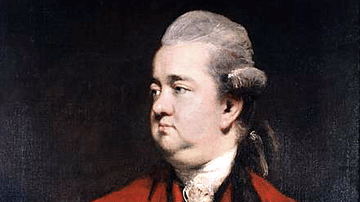Search Definitions
Browse Content (p. 39)

Definition
Thomas Paine
Thomas Paine (1737-1809) was an Anglo-American Enlightenment thinker whose radical ideas were taken up by revolutionaries in both the American Revolution (1765-1783) and the French Revolution (1789-1799). A Founding Father through his influence...

Definition
Edward Gibbon
Edward Gibbon (1737-1794) was an English historian most famous for his influential work The History of the Decline and Fall of the Roman Empire, volume one of which was published in 1776, with the final sixth volume coming in 1788. Gibbon's...

Definition
David Hume
David Hume (1711-1776) was a Scottish philosopher, writer, historian, and important figure in the Enlightenment. Hume presented a positive view of human nature but a sceptical view of religion's usefulness. His Treatise of Human Nature was...

Definition
Jean-Jacques Rousseau
Jean-Jacques Rousseau (1712-1778) was a Swiss philosopher whose work both praised and criticised the Enlightenment movement. Although a believer in the power of reason, science, and the arts, Rousseau was convinced that a flourishing culture...

Definition
First Continental Congress
The First Continental Congress was a meeting of delegates from twelve of the Thirteen Colonies of British North America that gathered in Philadelphia, Pennsylvania, from 5 September to 26 October 1774. Its primary purpose was to coordinate...

Definition
Mary Wollstonecraft
Mary Wollstonecraft (1759-1797) was an Enlightenment philosopher who, as author of A Vindication of the Rights of Woman, is widely credited as the founder of feminism. Wollstonecraft called for equal education opportunities for men and women...

Definition
Anne of Austria
Anne of Austria (1601-1666), as the wife of King Louis XIII of France (r. 1610-1643), was queen consort of France and of Navarre when the Kingdom of Navarre was annexed by the French Crown. She also acted as regent for her son, King Louis...

Definition
Adam Smith
Adam Smith (1723-1790) was a Scottish philosopher, economist, and leading Enlightenment figure. In The Wealth of Nations, he advocates free trade and limited interference in markets by governments, for which he is seen as the founder of liberal...

Definition
Intolerable Acts
The Intolerable Acts, also known as the Coercive Acts, were five laws passed by the Parliament of Great Britain in 1774 to punish the Thirteen Colonies of British North America for the Boston Tea Party. Though the acts primarily targeted...

Definition
Tsar
Tsar (also czar) is a Slavic term derived from the Latin caesar. Ivan III (Ivan the Great) (r. 1462-1505) was the first Russian ruler to begin using the title of tsar during his reign instead of the title Grand Prince of Moscow. His grandson...